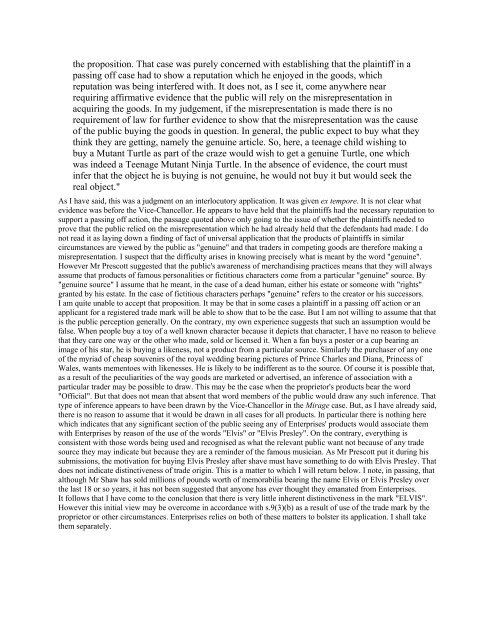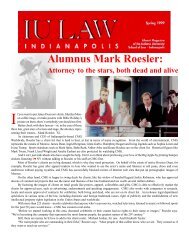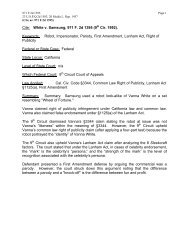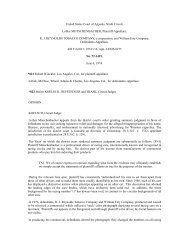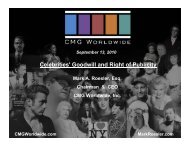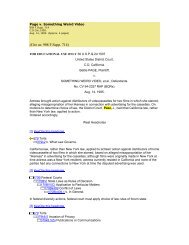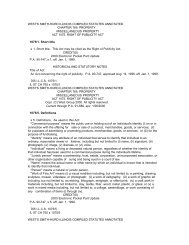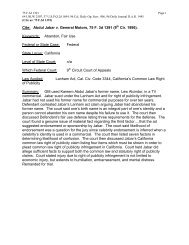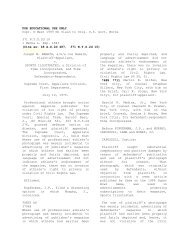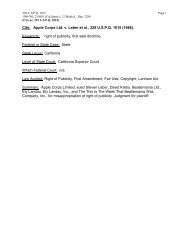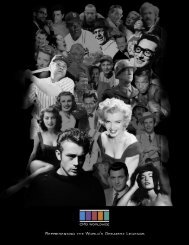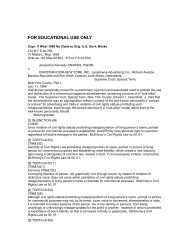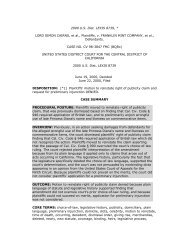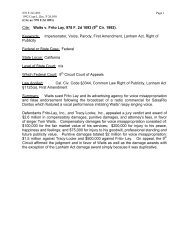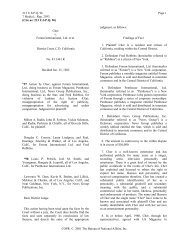Elvisly Yours v. Elvis Presley Enterprises Inc. - Mark Roesler
Elvisly Yours v. Elvis Presley Enterprises Inc. - Mark Roesler
Elvisly Yours v. Elvis Presley Enterprises Inc. - Mark Roesler
Create successful ePaper yourself
Turn your PDF publications into a flip-book with our unique Google optimized e-Paper software.
the proposition. That case was purely concerned with establishing that the plaintiff in apassing off case had to show a reputation which he enjoyed in the goods, whichreputation was being interfered with. It does not, as I see it, come anywhere nearrequiring affirmative evidence that the public will rely on the misrepresentation inacquiring the goods. In my judgement, if the misrepresentation is made there is norequirement of law for further evidence to show that the misrepresentation was the causeof the public buying the goods in question. In general, the public expect to buy what theythink they are getting, namely the genuine article. So, here, a teenage child wishing tobuy a Mutant Turtle as part of the craze would wish to get a genuine Turtle, one whichwas indeed a Teenage Mutant Ninja Turtle. In the absence of evidence, the court mustinfer that the object he is buying is not genuine, he would not buy it but would seek thereal object."As I have said, this was a judgment on an interlocutory application. It was given ex tempore. It is not clear whatevidence was before the Vice-Chancellor. He appears to have held that the plaintiffs had the necessary reputation tosupport a passing off action, the passage quoted above only going to the issue of whether the plaintiffs needed toprove that the public relied on the misrepresentation which he had already held that the defendants had made. I donot read it as laying down a finding of fact of universal application that the products of plaintiffs in similarcircumstances are viewed by the public as "genuine" and that traders in competing goods are therefore making amisrepresentation. I suspect that the difficulty arises in knowing precisely what is meant by the word "genuine".However Mr Prescott suggested that the public's awareness of merchandising practices means that they will alwaysassume that products of famous personalities or fictitious characters come from a particular "genuine" source. By"genuine source" I assume that he meant, in the case of a dead human, either his estate or someone with "rights"granted by his estate. In the case of fictitious characters perhaps "genuine" refers to the creator or his successors.I am quite unable to accept that proposition. It may be that in some cases a plaintiff in a passing off action or anapplicant for a registered trade mark will be able to show that to be the case. But I am not willing to assume that thatis the public perception generally. On the contrary, my own experience suggests that such an assumption would befalse. When people buy a toy of a well known character because it depicts that character, I have no reason to believethat they care one way or the other who made, sold or licensed it. When a fan buys a poster or a cup bearing animage of his star, he is buying a likeness, not a product from a particular source. Similarly the purchaser of any oneof the myriad of cheap souvenirs of the royal wedding bearing pictures of Prince Charles and Diana, Princess ofWales, wants mementoes with likenesses. He is likely to be indifferent as to the source. Of course it is possible that,as a result of the peculiarities of the way goods are marketed or advertised, an inference of association with aparticular trader may be possible to draw. This may be the case when the proprietor's products bear the word"Official". But that does not mean that absent that word members of the public would draw any such inference. Thattype of inference appears to have been drawn by the Vice-Chancellor in the Mirage case. But, as I have already said,there is no reason to assume that it would be drawn in all cases for all products. In particular there is nothing herewhich indicates that any significant section of the public seeing any of <strong>Enterprises</strong>' products would associate themwith <strong>Enterprises</strong> by reason of the use of the words "<strong>Elvis</strong>" or "<strong>Elvis</strong> <strong>Presley</strong>". On the contrary, everything isconsistent with those words being used and recognised as what the relevant public want not because of any tradesource they may indicate but because they are a reminder of the famous musician. As Mr Prescott put it during hissubmissions, the motivation for buying <strong>Elvis</strong> <strong>Presley</strong> after shave must have something to do with <strong>Elvis</strong> <strong>Presley</strong>. Thatdoes not indicate distinctiveness of trade origin. This is a matter to which I will return below. I note, in passing, thatalthough Mr Shaw has sold millions of pounds worth of memorabilia bearing the name <strong>Elvis</strong> or <strong>Elvis</strong> <strong>Presley</strong> overthe last 18 or so years, it has not been suggested that anyone has ever thought they emanated from <strong>Enterprises</strong>.It follows that I have come to the conclusion that there is very little inherent distinctiveness in the mark "ELVIS".However this initial view may be overcome in accordance with s.9(3)(b) as a result of use of the trade mark by theproprietor or other circumstances. <strong>Enterprises</strong> relies on both of these matters to bolster its application. I shall takethem separately.


